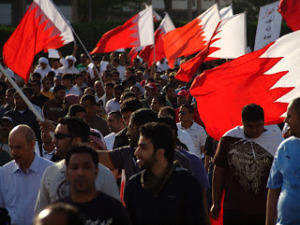
Opposition movements led by Al-Vifak claimed that they had already mailed their vision of national reconciliation, on the basis of ideas once expressed by the Crown Prince. It contains more demands and conditions than compromises, which is quite understandable, if we recall what happened three years ago – the authorities violently repressed, with the support of a Saudi military contingent, mass demonstrations by the Shiites. The opposition demands that negotiations should be held directly with the ruling royal family. This is also quite understandable, as the leaders of Al-Vifak and other opposition organizations are much annoyed by the authorities striking at the Shiite’s religious centre – the Islamic council Al-Ulama – just as the Crown Prince Salman announced his desire to overcome the split in Bahrain society on the basis of a nation-wide dialogue. What dialogue can there be, if Bahrain’s rulers are nice while they speak, but their actions remain a continuation of their repressive policies against the Shiites? Claims of Bahrain security officials – alleging that Al-Ulama was a coordination centre to maintain tensions in the kingdom’s Shiite community, stimulate protest moods, and nearly organized acts of violence – are wide open to criticism, as they provide no evidence.
During February 13-15, Manama and other population centres saw demonstrations and protests, which did not become large-scale confrontations like those in 2011. Large police contingents were deployed in the streets, and a Saudi military contingent was brought to an increased state of readiness. Nevertheless, protests took place in the capital and other cities to commemorate the public unrest three years ago – back then, mass disorders made FIA and FOM abandon their plans of holding Formula 1 races in this country. Afterwards, when a stage of the world championship returned to the Sahir motor-racing track, it evoked heavy criticism from the international democratic community.
It seems that history repeated itself, somewhat – there were more scuffles between protesters and law enforcement units in the streets of Bahrain, with Molotov cocktails being thrown at the police, and there were explosions in several population centres. One report said that in the village of Dair, which is situated less than 50 km from the motor-racing track, a policeman was killed by an explosion. The police used tear gas and shotgun pellets; several people were wounded. Over 30,000 people participated in the protests.
On Sunday morning January 16, there was no information about new confrontations between the protesters and Bahrain’s law enforcement agencies, but the local press reported that a journalist from a Dubai channel was hurt on Sunday. British subject Amjad Taha received injuries to the head while covering anti-government demonstrations, when protesters began throwing stones and Molotov cocktails at the police. The reporter received medical aid on the spot, and the injuries were not life threatening. The Bahrain newspaper Gulf Daily News published excerpts from the address of the UN Secretary General Ban Ki-moon, who called on both sides to exercise self-restraint and abstain from violent measures. He demanded that the country’s authorities act in strict compliance with international human rights standards, but also expressly condemned any attacks against Bahrain’s law and order forces. Acts of violence on the part of the protesters have also been condemned by representatives of Great Britain and the USA, while nothing was said about the continuing discriminative policies of the Al Khalif dynasty towards the Shiite majority.
It is quite evident that the tense situation in Bahrain will continue until the authorities engage in a real dialogue with the opposition, in order to equalize the rights of Sunnites and Shiites.
However, under circumstances when at any time the kingdom’s security forces and police, as well as Saudi Arabia’s armed forces, can resort to the most severe measures to suppress peaceful demonstrations, the leaders of opposition organizations will not dare to stage powerful anti-government protests, in order to avoid reprisals, as had been the case in 2011.
Vladimir Simonov, Middle East expert, PhD of History Sciences, exclusively for the New Eastern Outlook online magazine.
